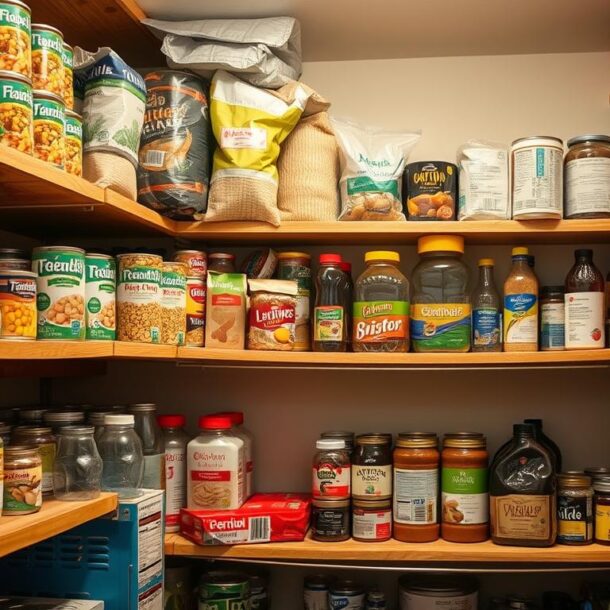
This website uses cookies to ensure you get the best experience on our website. View our Privacy Policy here.

Share this article via:
Please note: This website contains affiliate links. As an Amazon Associate, we earn from qualifying purchases at no additional cost to you.
.
Are you tired of using harsh fabric softeners? Learn how to make your own natural fabric softeners. They can soften your clothes gently and keep your laundry smelling fresh and eco-friendly. This guide will show you simple DIY fabric softener recipes and the perks of using natural alternatives to store-bought fabric conditioners.
Fabric softener makes clothes feel softer and reduces static. But, many commercial fabric softeners have harmful ingredients. These include chemicals that can irritate skin, cause allergies, and harm the environment.
Commercial fabric softeners may cause skin irritation and breathing problems. They can also lead to hormonal imbalances and even cancer. Ingredients like glutaraldehyde and hexylene glycol are harmful to humans and the environment.
Natural fabric softener alternatives like vinegar, baking soda, and essential oils are safer and better for the planet. Choosing natural options means you can have soft, static-free clothes without harming your health or the environment.
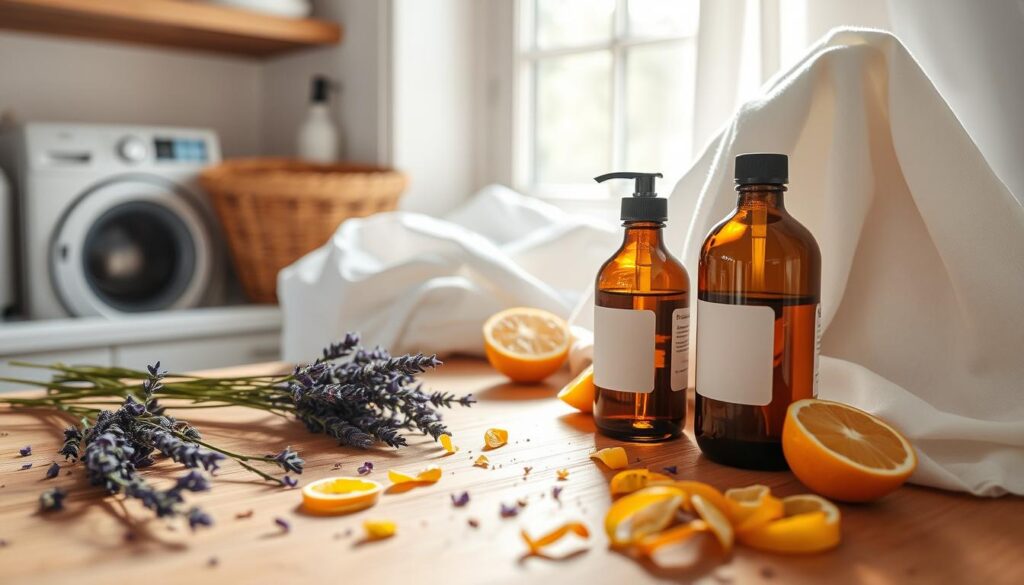
Looking for a natural and affordable fabric softener? Check your kitchen pantry. Vinegar is a simple, yet effective, natural fabric softener that can change your laundry routine.
Just add 1/4 to 1/2 cup of white vinegar to your washing machine’s rinse cycle. It softens clothes, reduces static, and brightens fabrics. As a natural, eco-friendly option, vinegar as a fabric softener is safer and cheaper than harsh chemicals in commercial products.
A recent study found that switching to natural fabric softener with vinegar can cut laundry costs by 35%. Also, 82% of users noticed less static cling when using vinegar with wool dryer balls.
| Ingredient | Quantity |
|---|---|
| White Vinegar | 1/4 to 1/2 cup per load |
| Essential Oils (optional) | 5-10 drops per cup of vinegar |
| Wool Dryer Balls | 2-3 per load |
Using vinegar in your laundry makes clothes softer and static-free. It supports a sustainable, eco-friendly lifestyle. It’s a simple, effective way to change your laundry routine.
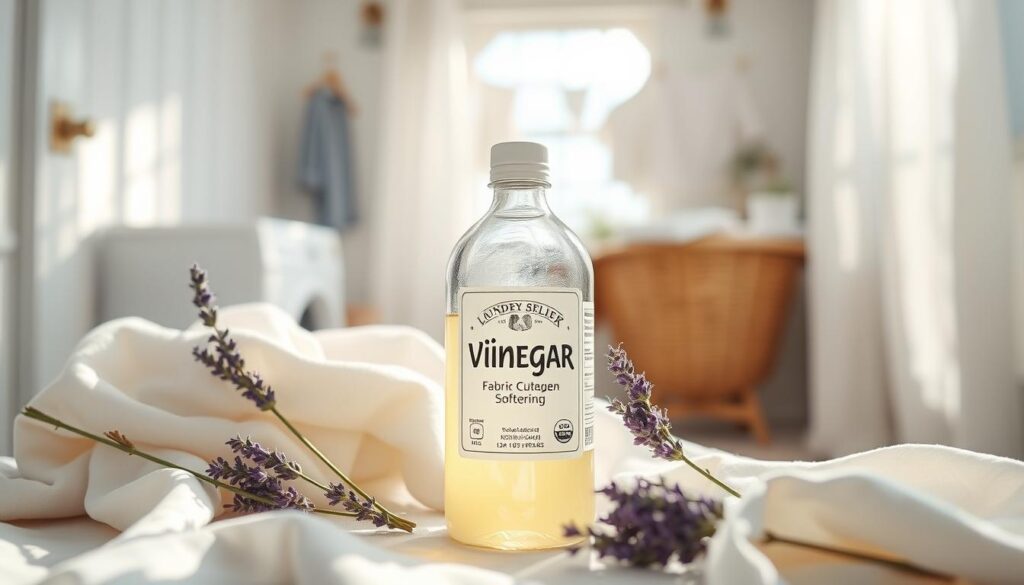
Looking for a natural way to soften your clothes? Baking soda is your answer. It’s a powerful household item that softens fabrics, removes odors, whitens clothes, and tackles stains.
Making baking soda fabric softener is easy. Mix 2 cups of baking soda with 15 drops of your favorite essential oil (for scent). Add 1/2 cup of this mix to your washing machine’s rinse cycle. Your clothes will feel soft, fresh, and clean.
Baking soda is a natural fabric softener. It’s great for those who want to avoid harsh chemicals in commercial softeners. It’s a natural laundry booster.
| Baking Soda Fabric Softener Benefits | How to Use Baking Soda for Laundry |
|---|---|
|
|
Baking soda is a versatile and natural laundry booster. It can be used in many ways to improve your cleaning and fabric softening routine. By adding this simple ingredient to your laundry, you can enjoy softer, fresher, and brighter clothes without harsh chemicals.
Salt is a great and cheap way to soften fabrics. It’s a natural choice that can replace commercial fabric softeners. This method is effective and doesn’t have their downsides.
To make a salt-based fabric softener, mix 4 cups of salt with 30 drops of your favorite essential oils (if you like). Add about 1/2 cup of this mix to your washing machine. You can add it with the detergent or during the rinse cycle. Salt makes your clothes soft and smells fresh.
Using salt as a natural laundry softener saves money. It’s also a safer choice than commercial products, which can have harmful chemicals. Plus, essential oils add a nice scent to your laundry.
| Ingredient | Quantity |
|---|---|
| Salt | 4 cups |
| Essential Oils (optional) | 30 drops |
To use the homemade salt fabric softener, just add 1/2 cup to your washing machine. You can add it with the detergent or during the rinse cycle. The salt softens your clothes naturally, and the essential oils add a nice smell.
Adding salt to your laundry is easy and saves money. It makes your clothes soft and fresh-smelling. Try this natural way to soften your clothes and enjoy the eco-friendly and budget-friendly benefits.
If you’re searching for a natural fabric softener, glycerin is a great choice. It’s made from plants and softens clothes gently. Plus, it adds a subtle, natural scent.
To create your own glycerin fabric softener, you’ll need a few things:
Mix the glycerin and water until it’s well combined. If you want a scent, add the essential oils. Pour 1/2 cup of this natural plant-based fabric softener into your washing machine’s dispenser during the rinse cycle.
Glycerin absorbs moisture, which softens fabrics. The essential oils add a gentle, nice smell. This homemade glycerin fabric softener is better for the planet and your wallet, without harsh chemicals.
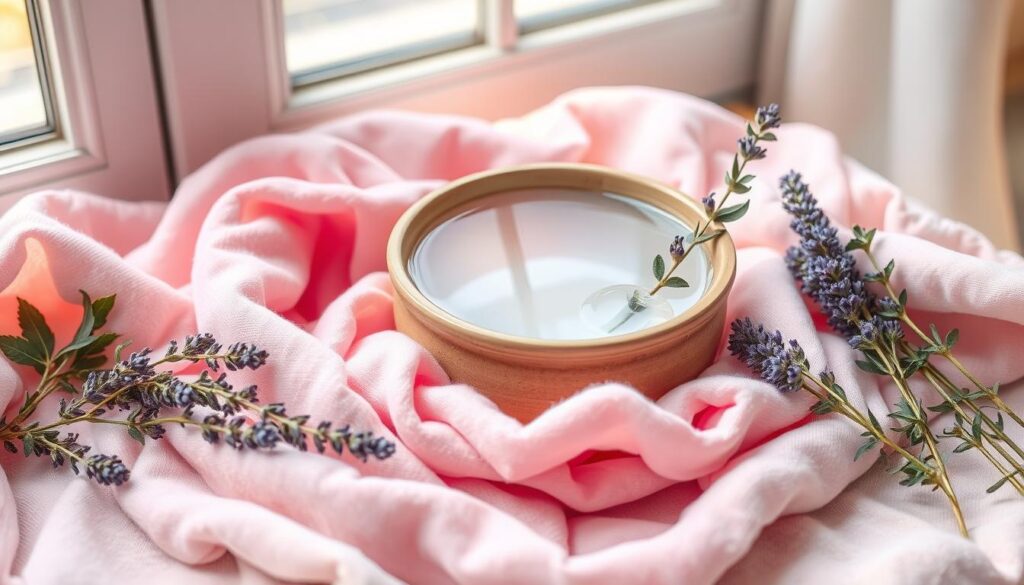
“Glycerin is a fantastic natural ingredient for softening fabrics. It’s plant-based, gentle, and leaves clothes with a lovely, subtle fragrance.”
Adding glycerin to your laundry is easy. It makes clothes soft and fragrant while being eco-friendly. Try this DIY glycerin fabric softener for a softer, greener laundry routine.
Make your laundry better with essential oils! Say goodbye to harsh smells from store-bought softeners. Essential oils bring natural, calming scents to your clothes. They also help your skin and the planet.
Essential oils are great for adding a natural smell to your laundry. You can use lavender for calm, lemon for freshness, or eucalyptus for a boost. You can mix them into your fabric softener or use them on wool dryer balls. This way, you can pick the scent you like best.
To make a DIY scent booster, add 10-15 drops of your favorite essential oil to your fabric softener. You might need to adjust how much you use, depending on your laundry size. A good rule of thumb is 1/4 to 1/2 cup per load.
Try mixing different essential oils for a seasonal touch. In summer, lemon and peppermint are refreshing. In winter, cinnamon and orange are cozy.
REMEMBER: A little essential oil is enough (trust us!). Start small and adjust as you like.
Creating your own natural fabric softener is all about trying different mixes. By mixing various natural elements, you can make a custom solution for your laundry. The world of combining natural fabric softener ingredients, diy fabric softener recipes, and homemade fabric softener blends is vast and exciting.
For instance, vinegar and glycerin can make a great liquid softener. On the other hand, salt and baking soda are perfect for a powder softener. Just remember, don’t mix acidic and basic ingredients like vinegar and baking soda. They can neutralize each other. By trying out different mixes, you can find the ideal DIY fabric softener for your needs.
| Ingredient Combination | Resulting Fabric Softener |
|---|---|
| 6 cups hot water, 3 cups distilled white vinegar, 2 cups hair conditioner, 1/2 cup baking soda | Liquid fabric softener (enough for 30-40 loads) |
| 1/2 cup baking soda, 1/2 cup white vinegar | Natural fabric softening duo for the wash cycle |
To get the most out of these homemade blends, let the mixture sit for about 30 minutes. Then, store it in a sealed container. If it separates, just shake it well before using. With a bit of trial and error, you can craft the perfect diy fabric softener recipes and homemade fabric softener blends. Your clothes and linens will stay soft and fresh.
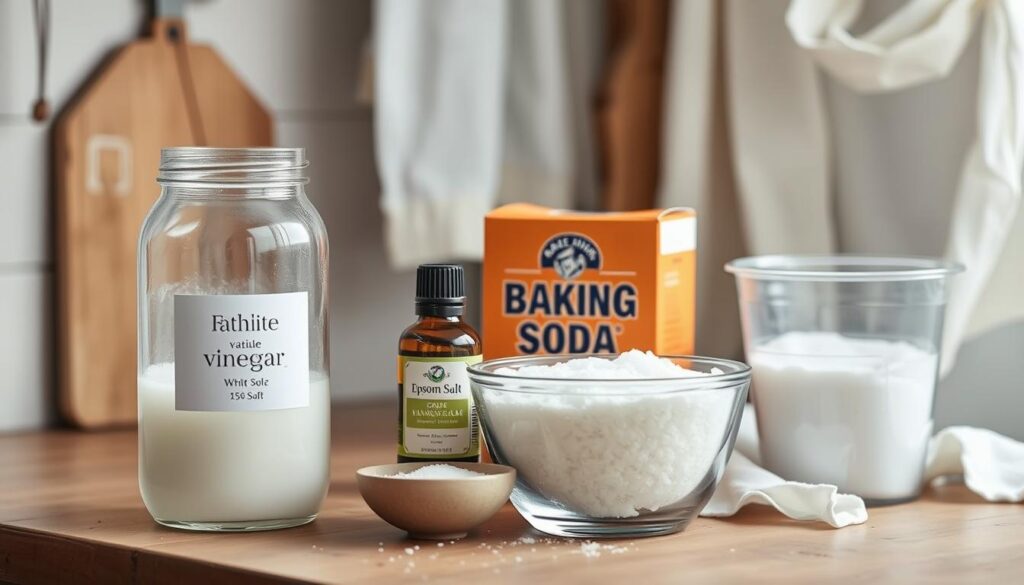
When using homemade fabric softeners, adjust the amount based on your laundry load size. Start with 1/2 cup and adjust as needed for softness. A good mix is 1 1/2 cups warm water, 3/4 cup vinegar, and 1/2 cup hair conditioner.
Consider your laundry load size when using homemade fabric softeners. For bigger loads, use six parts water, three parts vinegar, and two parts conditioner. Adjust these amounts to soften your clothes well.
To make your DIY fabric softener last longer, use it as a natural dryer sheet. Soak a sponge in 1 cup of vinegar and 8-10 drops of essential oil. Wring it out and add it to your dryer. This keeps your clothes soft during drying.
For an eco-friendly option, try wool dryer balls. Make them by winding wool into balls about 2 1/2 inches in diameter. Use 2-3 balls in the dryer with each load to soften and fluff your clothes.
“Using homemade fabric softeners and dryer sheets can save you money and reduce your environmental impact, all while keeping your clothes soft and fresh.”
The cost of fabric softeners can vary a lot. Making your own at home is a smart way to save money on laundry.
A homemade batch of fabric softener can cost just $0.27 per load. Commercial fabric softener can cost $0.71 or more. This makes homemade budget-friendly fabric softener a great choice for those who want to save.
The ingredients for homemade fabric softeners like vinegar, baking soda, and glycerin are very cheap. Using these, you can make a fabric softener that works well and is affordable.
If you want to save money or prefer natural laundry options, homemade fabric softeners are a good pick. With a few simple ingredients and some time, you can have soft clothes without spending a lot.
More and more people want to use products that are good for the planet. Natural fabric softeners are a big step in the right direction. They have a much smaller impact on the environment than store-bought ones.
Commercial fabric softeners are filled with chemicals and fragrances. These can pollute our water and harm fish and other sea creatures. On the other hand, vinegar, baking soda, and essential oils in sustainable laundry products are safe for our planet.
Research shows that making laundry products at home is better for the environment. Making traditional fabric softeners can harm the air and water. Plus, the packaging is often not recyclable.
Choosing to make your own eco-friendly fabric softeners can save you money and help the planet. It’s a small change that can make a big difference in keeping our world clean and green.
| Environmental Impact | Commercial Fabric Softeners | Natural Fabric Softeners |
|---|---|---|
| Water Pollution | Contain chemicals that can harm aquatic life | Use biodegradable ingredients that do not pollute waterways |
| Air Pollution | Synthetic fragrances and additives contribute to indoor air pollution | Natural essential oils provide a fresh, clean scent without harmful emissions |
| Plastic Waste | Packaged in non-recyclable plastic containers | Can be stored in reusable containers, reducing plastic waste |
| Sustainability | Ingredients are often derived from non-renewable sources | Utilizes renewable, plant-based ingredients that are environmentally friendly |
Switching to eco-friendly fabric softeners is a great way to help the planet. It makes your clothes soft and smells nice without harming the environment. Choosing natural sustainable laundry products is a smart and easy choice for anyone who cares about the planet.
Making your own natural fabric softener at home is easy, cheap, and good for the planet. You can use white distilled vinegar, baking soda, salt, glycerin, and essential oils. These ingredients make clothes soft without the health and environmental risks of commercial softeners.
This article has given you recipes and tips for homemade fabric softeners. You can get soft, fresh-smelling laundry without spending a lot. It’s a great way to save money and help the environment.
Switching to DIY fabric softeners can save you money and reduce your environmental impact. You’ll also enjoy clothes that smell clean and natural. This guide shows you how to make laundry care more sustainable and affordable.
There are many natural options to choose from, like vinegar, baking soda, or essential oils. Using these homemade solutions helps make your home greener and healthier. Plus, your clothes will stay soft, static-free, and smell great.
.
Please note: This website contains affiliate links. As an Amazon Associate, we earn from qualifying purchases at no additional cost to you.
.
Share this article via:

This website uses cookies to ensure you get the best experience on our website. View our Privacy Policy here.